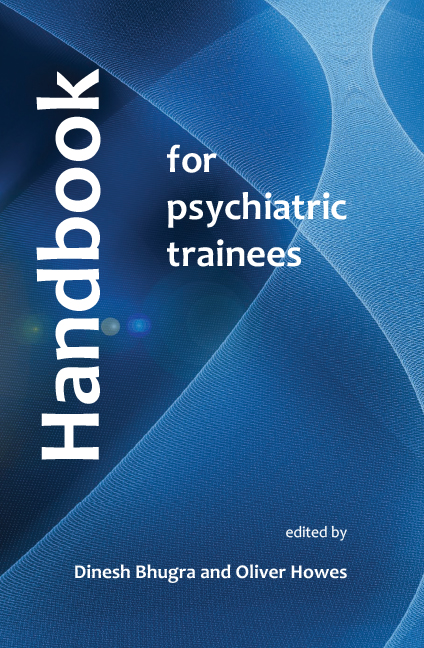Book contents
- Frontmatter
- Contents
- List of tables, boxes and figures
- List of contributors
- 1 Psychiatric training: the next steps
- Part 1
- Part 2
- Part 3
- 14 Personal safety
- 15 Managing violence
- 16 Managing difficult clinical situations
- 17 Understanding and managing stress
- 18 Managing time: the key to professional success
- 19 Negotiation skills
- 20 Presentation skills
- 21 Mental health review tribunals: reports and hearings
- 22 How to get published
- 23 Mental health informatics
- 24 Clinical governance
- 25 Lifelong learning and revalidation
- 26 Mentoring and shadowing
- 27 The MRCPsych examinations
- 28 Flexible training
- 29 UK training for overseas doctors and opportunities for UK doctors to train outside the EEC
- 30 Academic careers
- 31 Higher degrees
- Index
30 - Academic careers
from Part 3
- Frontmatter
- Contents
- List of tables, boxes and figures
- List of contributors
- 1 Psychiatric training: the next steps
- Part 1
- Part 2
- Part 3
- 14 Personal safety
- 15 Managing violence
- 16 Managing difficult clinical situations
- 17 Understanding and managing stress
- 18 Managing time: the key to professional success
- 19 Negotiation skills
- 20 Presentation skills
- 21 Mental health review tribunals: reports and hearings
- 22 How to get published
- 23 Mental health informatics
- 24 Clinical governance
- 25 Lifelong learning and revalidation
- 26 Mentoring and shadowing
- 27 The MRCPsych examinations
- 28 Flexible training
- 29 UK training for overseas doctors and opportunities for UK doctors to train outside the EEC
- 30 Academic careers
- 31 Higher degrees
- Index
Summary
Deciding that you want to be a clinical academic psychiatrist in the UK is not a career choice for the faint-hearted. Although combining academic and clinical interests is stimulating and fulfilling, none the less it involves many additional stresses that do not affect those who work entirely in a clinical setting.
First, as a clinical academic psychiatrist you serve two masters: the NHS trust for which you do your clinical work and the university for which you do your academic work. The number of programmed activities belonging to each will be carefully detailed in your job plan. At the time of writing, the majority of clinical academic psychiatrists spend 50% of their time working in the NHS and 50% for the university. The latter will be committed either to undergraduate and postgraduate teaching or to research. Clinical academics whose university time is spent on research are being increasingly pressured to obtain research funding, carry out the research and publish the results in high-impact journals (a journal whose papers are widely cited by others); the greater the number of citations an ‘average’ paper receives, the higher the impact score of the journal. This is due to the demands of the research assessment exercise (RAE), a regular (currently 5-yearly) peer review of all university academic departments’ research activity. Each university and academic department is ranked according to the international standing of its academic staff. Those with the highest ranking (currently a score of 6) receive the most financial support from the government. Consequently, like football teams, some major universities engage in headhunting ‘star players’, that is, individuals with the best track record of obtaining research grants and whose publications appear in high-impact international journals. From 2010, the RAE will be replaced by a ‘metrics’-based assessment for university academics. In addition to publications and grant income, this will include other measures of esteem in its evaluation.
Not all universities seek to engage in the RAE rounds of assessment. Instead, they focus on their teaching activities and in this respect academic departments are ranked on the teaching quality assessment (TQA). Although the ranking in the TQA is not as directly linked as the RAE to a university department'sincome, having a good reputation for teaching attracts more students, and more students means more fee income for the department.
- Type
- Chapter
- Information
- Handbook for Psychiatric Trainees , pp. 311 - 316Publisher: Royal College of PsychiatristsPrint publication year: 2008



